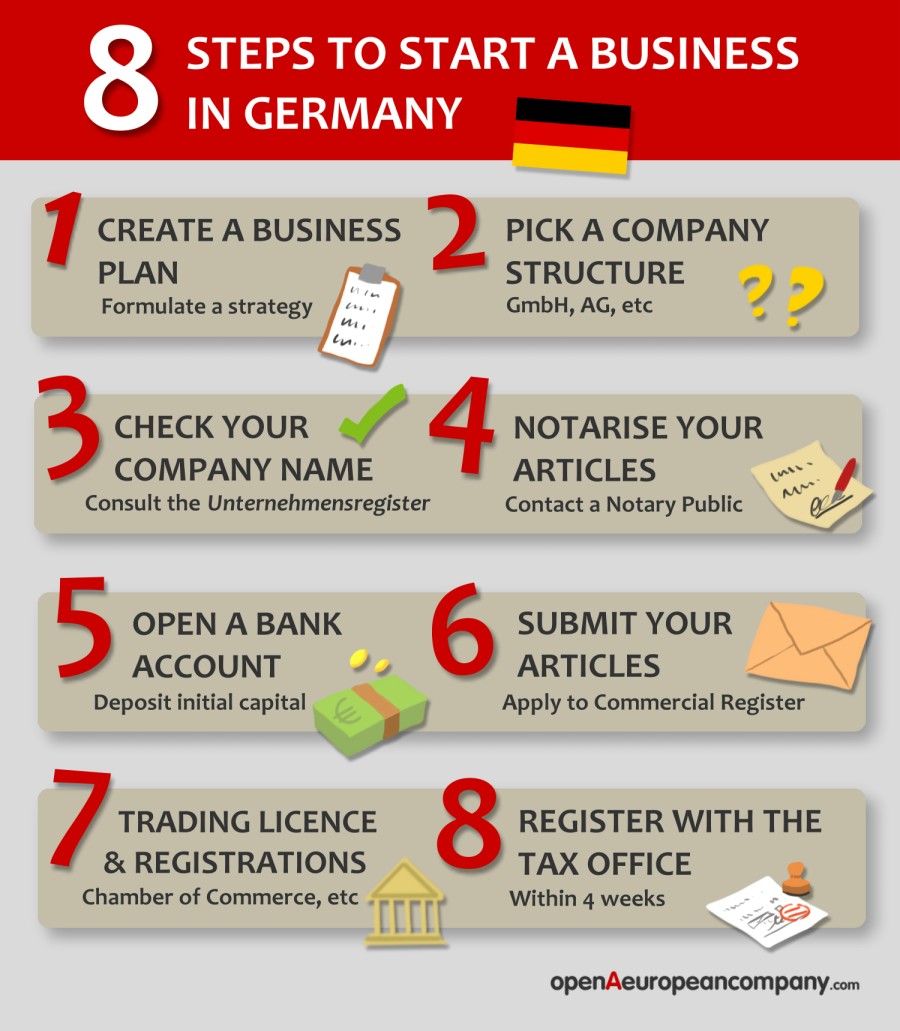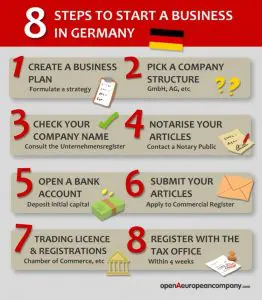Starting a company in Germany can be complicated, but we’ve put together 8 straightforward steps to help you navigate the bureaucratic waters of German business formation and get up and running with a minimum of confusion.

Step 1: Create a business plan
A new business venture in any country shouldn’t begin without first clarifying its goals and methods. Investors and bank managers will want to know your strategy, and a business plan will help you to focus on the market you’re targeting and how your money will be acquired, spent, and made.
Step 2: Pick a company structure
Some common German business types are:
- Gesellschaft mit beschränkter Haftung (GmbH)
- Aktiengesellschaft (AG)
- Offene Handelsgesellschaft (OHG)
- Kommanditgesellschaft (KG)
- Subsidiary
- Branch
The GmbH is the most common type of business structure in Germany and can be formed by a single person who acts as the sole shareholder. It does require €25,000 of startup capital however, €12,500 of which must be present at the registration stage.
Step 3: Confirm your company name with the Unternehmensregister (business register)
The next step is to confirm that your desired company name is available for you to use. Fortunately, this is a simple enough process, with the Unternehmensregister website allowing you to search for previously registered company names and check that yours is unique.
Step 4: Notarise your Articles of Association
For most company structures you will need to notarise your Articles and Memorandum of Association (Gesellschaftsvertrag) with a Notary Public.
Step 5: Open a bank account and deposit capital
Next, you will need to open a German bank account containing the initial partnership capital (or at least enough to meet the minimum). Many German banks allow account creation online, meaning you can perform this step remotely – but be warned that most of the bank websites will be entirely in German. Bear in mind that you will still be required to provide proof of your identity – this might be done at your local Post Office, or you could enlist the help of a Notary Public or lawyer to verify you.
If you apply by visiting the bank in person, you or your representative may be asked to present your passport or an I.D. card, as well as a Meldebescheinigung (“registration certificate” – your proof of residence in Germany).
Step 6: Submit your Articles to the Commercial Register
Now, you will need to submit your Articles of Association through the Notary Public to the Commercial Register. You’ll need to file an application to the Register (with signatures certified by the Notary Public), the notarised Articles, a list of shareholders in the company, a notarised certificate of the deposition of the initial capital, and possibly a deed of appointment of the company directors. If successful, your new company will be published to the Handelsregister website.
Step 7: Apply for a trading licence and submit other registrations
Depending on the nature of your business, you may need to apply for a trading permit (Gewerbeerlaubnis) – for example, if your company is a broker, real estate agents, hotel or restaurant. Otherwise, you’ll need to apply to your local Trade Office for a trading licence (Gewerbeschein).
There are a number of other registrations and notifications to be performed at this stage:
- You must register at the Office of Statistics;
- You must also register with the relevant Chamber of Commerce;
- You must notify the local Labour Office, who will supply you with an 8-digit number for your business;
- You then need to contact the Social Security Agency with the number from the Labour Office;
- You’ll also need to register with the Office of Health Insurance.
Step 8: Register with the Tax Office
The final step is to register your new business with the local Tax Office within four weeks of its opening and within a month of the notarisation of the Articles. The entire process detailed in this post shouldn’t take more than a few days, so these deadlines shouldn’t pose any problem.
OpenAEuropeanCompany.com is always on hand to guide you through all of the stages of forming a new German company or expanding an existing one, and we also provide document services across Europe – we can act as your notary for all of the necessary procedures to get you up and running in Germany. Please don’t hesitate to call us on +44 (0) 20 8421 7470 or contact us via the website for help and advice.







